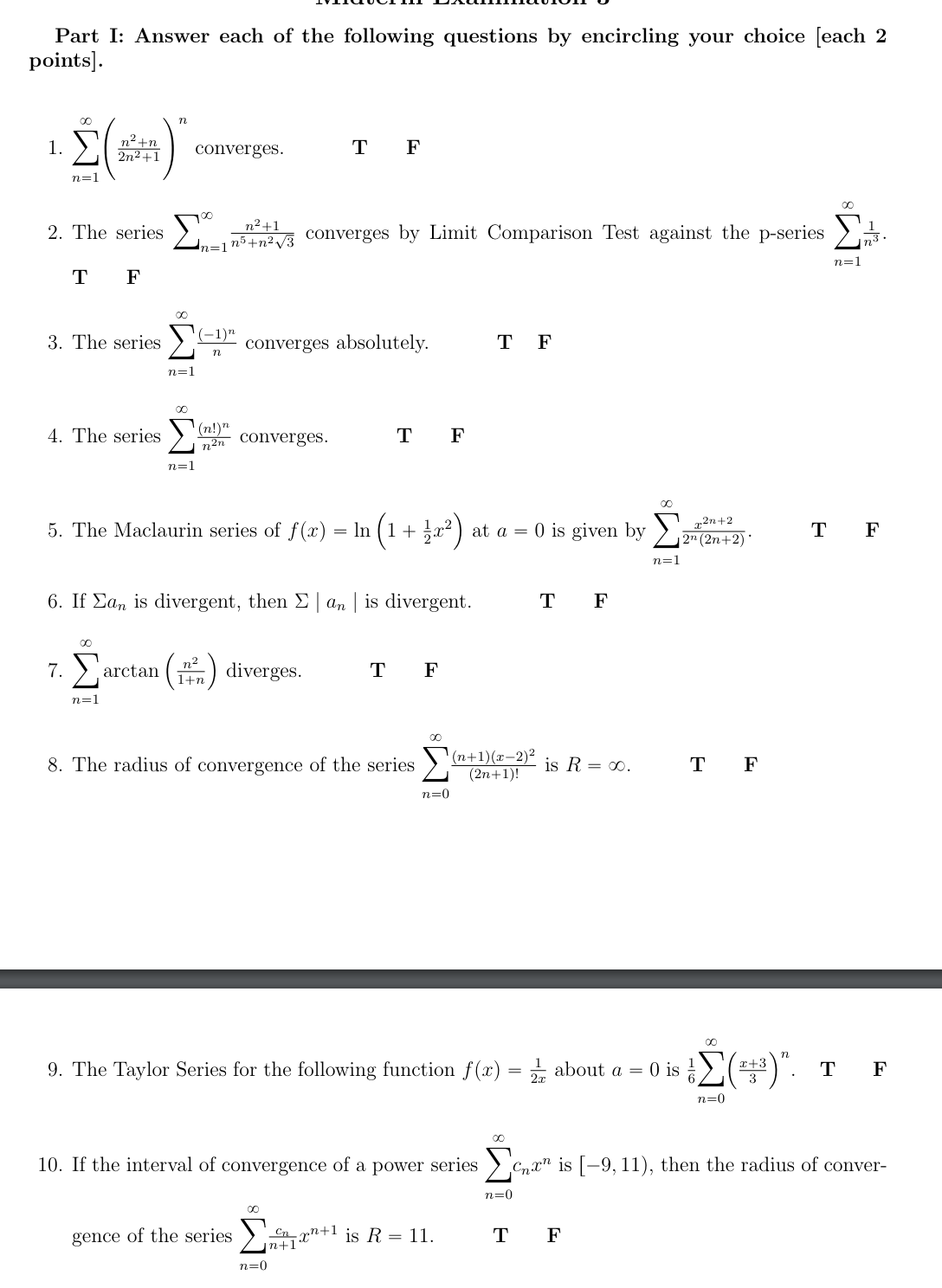(Solved): Part I: Answer each of the following questions by encircling your choice [each 2 points]. \sum_(n=1 ...
Part I: Answer each of the following questions by encircling your choice [each 2 points].
\sum_(n=1)^(\infty ) ((n^(2)+n)/(2n^(2)+1))^(n)converges.
,T,FThe series
\sum_(n=1)^(\infty ) (n^(2)+1)/(n^(5)+n^(2)\sqrt(3))converges by Limit Comparison Test against the p-series
\sum_(n=1)^(\infty ) (1)/(n^(3)). T
,F The series
\sum_(n=1)^(\infty ) ((-1)^(n))/(n)converges absolutely.
,FThe series
\sum_(n=1)^(\infty ) ((n!)^(n))/(n^(2n))converges.
,FThe Maclaurin series of
f(x)=ln(1+(1)/(2)x^(2))at
a=0is given by
\sum_(n=1)^(\infty ) (x^(2n+2))/(2^(n)(2n+2)).
,T,FIf
\Sigma a_(n)is divergent, then
\Sigma |a_(n)|is divergent.
,T,F
\sum_(n=1)^(\infty ) arctan((n^(2))/(1+n))diverges.
,FThe radius of convergence of the series
\sum_(n=0)^(\infty ) ((n+1)(x-2)^(2))/((2n+1)!)is
R=\infty .
,FPart I: Answer each of the following questions by encircling your choice [each 2 points].
\sum_(n=1)^(\infty ) ((n^(2)+n)/(2n^(2)+1))^(n)converges.
,FThe series
\sum_(n=1)^(\infty ) (n^(2)+1)/(n^(5)+n^(2)\sqrt(3))converges by Limit Comparison Test against the p-series
\sum_(n=1)^(\infty ) (1)/(n^(3)). T
FThe series
\sum_(n=1)^(\infty ) ((-1)^(n))/(n)converges absolutely.
,FThe series
\sum_(n=1)^(\infty ) ((n!)^(n))/(n^(2n))converges.
,FThe Maclaurin series of
f(x)=ln(1+(1)/(2)x^(2))at
a=0is given by
\sum_(n=1)^(\infty ) (x^(2n+2))/(2^(n)(2n+2)).
,T,FIf
\Sigma a_(n)is divergent, then
\Sigma |a_(n)|is divergent.
,T,F
\sum_(n=1)^(\infty ) arctan((n^(2))/(1+n))diverges.
,FThe radius of convergence of the series
\sum_(n=0)^(\infty ) ((n+1)(x-2)^(2))/((2n+1)!)is
R=\infty .
,FThe Taylor Series for the following function
f(x)=(1)/(2x)about
a=0is
(1)/(6)\sum_(n=0)^(\infty ) ((x+3)/(3))^(n).
,T,FIf the interval of convergence of a power series
\sum_(n=0)^(\infty ) c_(n)x^(n)is
[-9,11), then the radius of conver- gence of the series
\sum_(n=0)^(\infty ) (c_(n))/(n+1)x^(n+1)is
R=11.,T,F